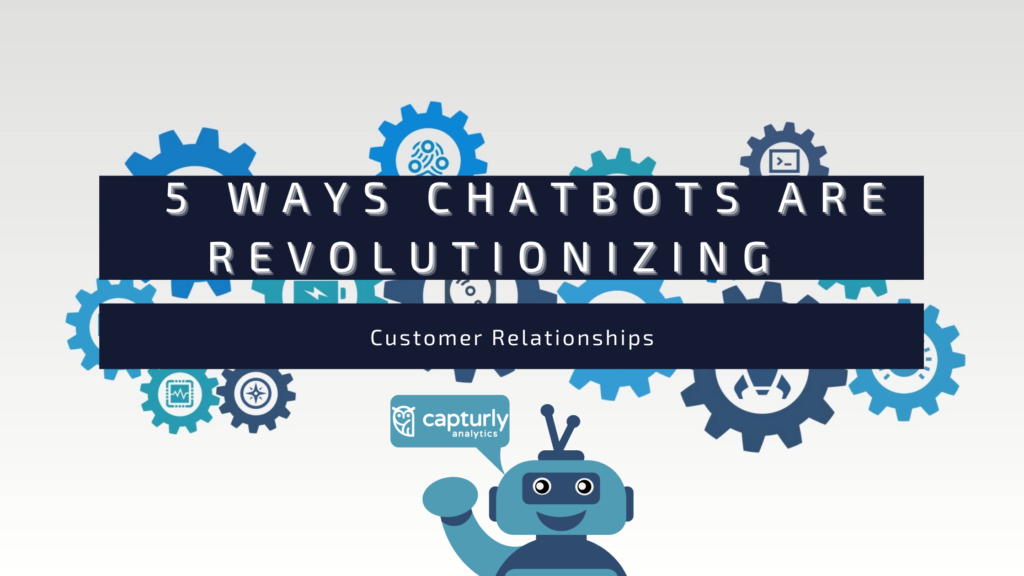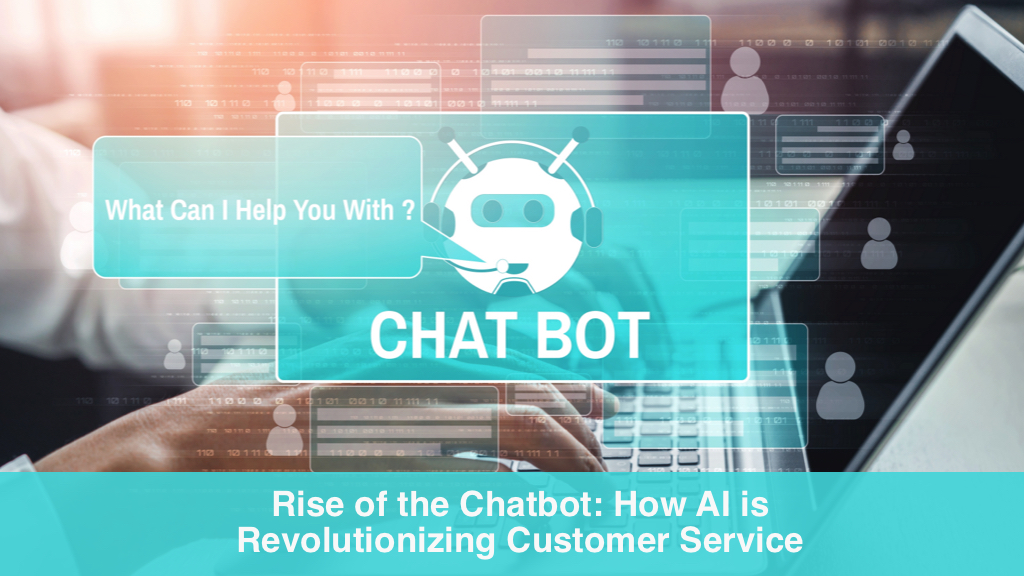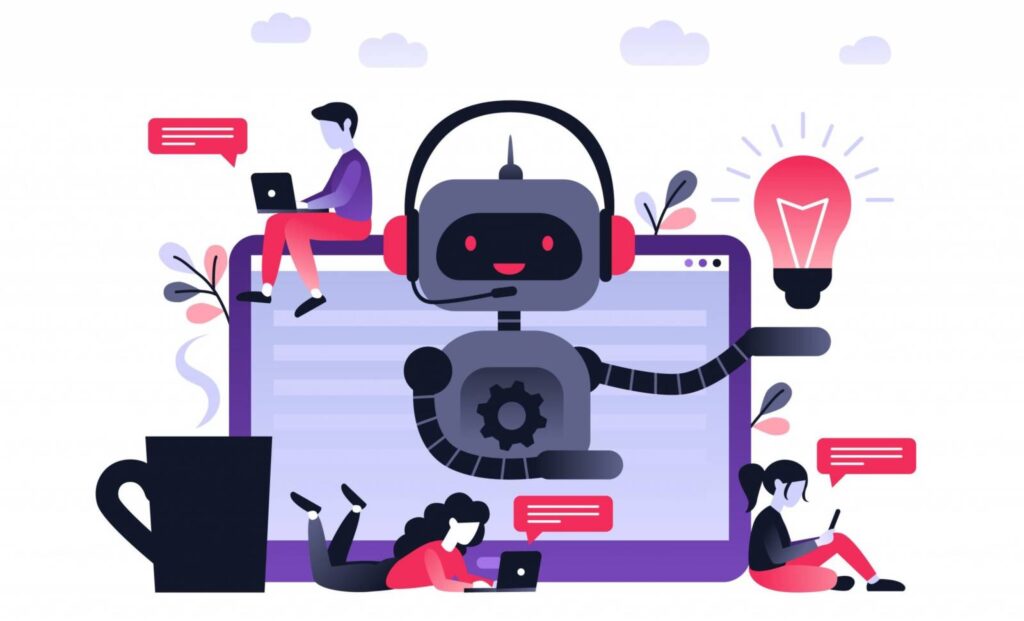Introduction to Chatbots in Business
The world of commerce is undergoing a transformation, and chatbots are at the forefront of this revolution. But what are they, and how do they fit into the business landscape?
Definition and Explanation of Chatbots
A chatbot is an artificial intelligence (AI) software designed to interact with humans in their natural language. These interactions typically take place through messaging applications, websites, mobile apps or through the telephone. They are programmed to understand what you are saying, and then deliver a pre-set reply. Beyond the simple give-and-take of user requests and automated responses, sophisticated chatbots powered by machine learning technologies understand language, not just commands, and continually learn from their interactions to better perform their tasks.
Evolution of Chatbots in the Realm of Business
Chatbots are not new in the business domain, but their use has skyrocketed in recent years due to advances in AI and natural language processing. Initially, businesses began using chatbots for customer service purposes – think automated responses on a bank’s website to assist with common queries. Today, they’re no longer confined to customer service roles. They’re spearheading the ordering process in restaurants, assisting in hiring procedures in HR departments, and even providing personalized recommendations in retail sectors. Astonishingly, chatbots are also actively involved in decision-making processes and perform data analysis tasks easily.
Driven by a plethora of benefits that includes but not limited to cost savings, 24/7 availability, and instant response to queries, chatbots are indeed revolutionizing the way businesses interact with their customers, improve their services, and make decisions.
Through the integration of chatbots, businesses see efficiency not seen before. It is clear that chatbots are more than just a passing trend – they’re a powerful business tool in this digital age. Stay tuned as we continue to explore the integration of chatbots in various industries and their impact on our daily transactions.

This image is property of capturly.com.
Understanding the Chatbots Technology
Chatbots have burst onto the business scene and are revolutionizing the way companies interact with their customers. These AI driven virtual assistants have made it possible for businesses to engage their customers in real-time, with personalised service, at scale.
Working Mechanism of Chatbots
Chatbots work by using natural language processing (NLP) and machine learning (ML). This allows them to understand the customer’s request, process it, and give a relevant response. A chatbot first receives a user’s text input, then it processes the information to determine the best response based on its programming. It then provides feedback to the user, keeping the interaction fluid and conversational. They continue to refine and improve their responses over time due to their self-learning capabilities. This makes them a valuable tool for businesses wishing to boost customer engagement and satisfaction.
Different Types of Chatbots and Their Functionalities
There are mainly two types of chatbots – rule-based and machine learning-based.
Rule-based chatbots function based on a predefined set of rules. They are primarily used for basic customer service functions like handling FAQs or simple transactions. These chatbots can only provide answers to specific commands they’re designed to respond to.
On the other hand, Machine learning-based chatbots learn from user interactions and get smarter with time. They are able to handle more complex interactions and can answer questions that they have not been explicitly programmed to handle.
To sum up, whether it’s a rule-based chatbot handling standard FAQs or a machine learning-based chatbot handling complex service requests, each type of chatbot plays a critical role in enhancing the customer experience and revolutionizing the way businesses interact with their customers.

This image is property of dashtechinc.com.
Revolutionizing Commerce: Chatbots in Business
The digital age is continually introducing technologies that are transforming commerce. One such technology that has taken the business world by storm is the use of Chatbots. Enabled by artificial intelligence (AI), chatbots are revolutionizing the way businesses engage with their customers, revolutionize operations and drive growth.
Role of AI in Chatbots
AI plays a crucial role in chatbots, animating them to conduct tasks in a more personalized, efficient, and intelligent manner. AI in chatbots navigates vast amounts of data to understand user requests, learn from them, and deliver relevant responses. This learning ability of chatbots, powered by machine learning, an AI subfield, forms the core of their potential. The more interactions they have, the better their performance in delivering a more personalized user experience.
How AI enhances chatbot features
AI enriches chatbots, transforming them from mere programmed software to smart bots capable of interpreting and responding to user requests intelligently. AI extends the functionality of chatbots beyond typical responses to complex tasks such as processing large datasets, analyzing customer behavior and preferences, and delivering personalized content. AI-enabled chatbots can understand context, sarcasm, and even emotions, making them more human-like and enhancing their engagement capacity.
AI chatbots versus traditional chatbots
Unlike traditional rule-based chatbots, AI chatbots surpass the limitation of pre-established commands. They can understand and interpret user requests, making conversations more interactive and fulfilling. With AI, Chatbots grasp and learn from every interaction, continuously improving their engagement, driving customer satisfaction, and ultimately, business performance. It’s no surprise that more business owners are shifting to incorporate AI chatbots into their digital strategy, given their ability to streamline operations and deliver an enhanced customer experience.
The transformation of commerce continues as AI powers more technological advancements. Among these, chatbots stand out as a key technology piece that businesses leverage to stay ahead in a competitive and fast-paced digital landscape.

This image is property of quiq.com.
Modifying Business Operations with Chatbots
The digital sphere is evolving, and businesses are adapting rapidly to keep pace. One of these changes is the introduction of chatbots into the business operations which is revolutionizing commerce by offering incredible potentials. They play a crucial role in enhancing interactions with clients and improving the efficiency of internal communications.
Impact on client interaction
Chatbots can significantly reshape the customer-business relationship. They are available 24/7 to answer queries, provide information, resolve complaints and conduct sales. When it comes to online shopping experiences, chatbots can provide personalized service by recommending products based on customer preference. Moreover, they can interact in various languages, making it possible to cater a global audience seamlessly. This will undoubtedly lead to improved customer satisfaction and elevated brand reputation.
Enhancements in internal communication
But the magic of chatbots is not only confined to customer interactions. They can significantly optimize internal communications as well. By automating routine tasks, they can save time and resources, allowing employees to concentrate on strategy and creativity. For instance, chatbots can manage schedules, provide updates, and answer FAQs. They can streamline operations by organizing data and generating reports. They are like your virtual assistants, always ready to carry out tasks efficiently.
Embracing chatbots in business operations is no longer a trendy option; it’s a strategic necessity. They are the gears driving customer relationship management and internal communication to higher efficiency levels, transforming conventional trade into intelligent commerce. The immediacy and personalization they bring to the table makes them indispensable in any modern business operation. Remember, the future of business is not just digital, but also interactive – and chatbots are leading this wave.
In embracing change and the future, let’s explore the potentials of chatbots together. Will you join me on this journey?

This image is property of invocom-s3.s3.ap-south-1.amazonaws.com.
Chatbots and Customer Service
As part of the evolving technological landscape, I strongly believe that chatbots have carved their niche especially in the sphere of e-commerce. I wish to discuss their remarkable contribution to customer service, mainly focusing on how they improve customer experience, and their ability to provide 24/7 support.
Improvement in Customer Experience
I’ve noticed that one area where chatbots are truly revolutionizing e-commerce is through the improved customer experience they provide. These AI-powered solutions consist of pre-programmed responses which effectively handle a variety of customer queries. Their swift responses limit customer wait time, leading to heightened user satisfaction. Additionally, chatbots are able to navigate through complex questions by offering detailed responses which have led to a simplified purchasing process.
What struck me as fascinating is the fact that chatbots are increasingly becoming interactive, engaging customers in a personalized conversation. This has enabled e-commerce platforms to offer a customer experience that is not just transactional but also interactive, much appreciated in today’s digital era.
24/7 Customer Support Via Chatbots
The beauty of leveraging chatbots in e-commerce lies in their ability to deliver customer support around the clock. Unlike a traditional customer service setup, chatbots can operate unhindered regardless of time zones or public holidays. This means that businesses like mine can cater to our customers’ needs anytime, anywhere.
Living in a world that is connected 24/7, it’s imperative for businesses to shift from the classic 9-5 customer service model to a more versatile approach. I consider chatbots as the perfect solution. They can handle multiple customer queries simultaneously without compromising on the quality of service.
Adopting chatbots in business operations can lead to an improved customer experience and offer a more refined form of customer support.

This image is property of sp-ao.shortpixel.ai.
In today’s ever-evolving digital landscape, businesses are constantly seeking ways to streamline operations, enhance customer experience, and drive sales. A tool rapidly growing in popularity are chatbots that utilize AI to automate various aspects of e-commerce from personalized shopping to handling transactions.
Personalized shopping experience through chatbots
One tremendous advantage of integrating chatbots in your business lies in their ability to offer a highly-personalized shopping experience to customers. They’re programmed to remember an individual customer’s habits, preferences and buying patterns. This allows them to make tailored product recommendations that not only accommodate a customer’s specific needs, but also streamline their shopping journey.
Furthermore, these bots are available 24/7 meaning that your customers can engage with your business at a time that suits them. This around-the-clock availability significantly boosts customer satisfaction and subsequently, your bottom line.
Chatbots in managing transactions
Beyond creating personalized experiences, chatbots also play a crucial role in managing transactions. They simplify the purchasing process by providing customers with a one-on-one guided tour through an online store, product listing, and the checkout process. It’s a digitized sales associate who never sleeps, works at lightning speed, and commits to customer satisfaction.
Plus, these friendly chatbots assist in mitigating cart abandonment–a common problem in e-commerce–by reminding customers about products left in their carts and facilitating seamless checkouts.
In short, chatbots can revolutionize commerce. Whether providing a bespoke and integrated shopping experience or handling transactions effortlessly, they’re invaluable for businesses. Be it small scale or multinational giants, everyone is now leveraging them to generate substantial revenue. As a business owner in today’s fast pace online market, I’ve experienced firsthand the role of AI in transforming commerce. One of the game-changers we’ve seen in recent years is the rise of chatbots in business. But what’s the real potential behind this technology? How can it be effectively monetized for a successful online business?
Monetizing AI in Online Business
For me, the heart of monetizing AI begins with leveraging chatbots effectively. Chatbots drive revenues by providing 24/7 customer support, quickly resolving customer queries, thus improving customer satisfaction and promoting loyalty. Due to their multitasking capabilities and prompt responses, they can service multiple customers simultaneously efficiently. This boosted productivity could lead to an increase in sales conversions.
Role of Chatbots in Driving Revenues
But it isn’t just about customer interaction. Chatbots are also smart upselling and cross-selling tools. They provide personalized product or service recommendations based on customer’s purchasing behavior and preferences, enhancing the potential for additional revenue. Plus, they capture user data, helping to better understand customers and fine-tune business strategies.
Cost Effectiveness of Chatbot Integration
On the cost side of things, integrating chatbots into your online business operations can be incredibly efficient. Unlike human representatives, chatbots do not require salaries, benefits, or breaks. This AI-powered tool can handle numerous enquiries, reducing the workload on human customer service representatives and consequently, reducing operation costs. The investment in chatbot technology could potentially yield a substantial return on investment in the long run.
Chatbots and Marketing Strategies
These days, when you visit a website, you’re likely met with a friendly chatbot eager to help you navigate or answer your questions right off the bat. It’s not just about being helpful, it’s a downright revolutionary tactic that is reshaping the field of commerce with the implementation of AI in business strategies.
Chatbots in Personalized Marketing
Chatbots are changing the game in the realm of personalized marketing. These AI powered virtual assistants can collect information about the user, such as browsing history, demographic data, and personal preferences. This enables businesses to tailor their services and products to each individual customer on a highly personalized level. Chatbots can also send personalized messages or recommend products based on previous purchases or browsing habits.
Imagine getting suggestions from an online bookstore about new releases from your favourite authors or genres because their chatbot remembered your preferences! Not only is this a dream come true for customers who want personalised experiences without having to sift through irrelevant content, but these revolutionary tools also help businesses increase customer retention, upsell, and cross-sell products.
Effectiveness of Chatbots in Advertisements
Next, let’s delve into the effectiveness of chatbots in advertising. Ever noticed that sometimes, ads that pop up on your social media are oddly specific? That’s likely the work of chatbots. These AI-driven tools play a pivotal role in collecting data and analyzing user behavior, allowing companies to create targeted advertisements that better resonate with their audience.
You see, chatbots ensure that ads are not just seen, but also engaged with. They can answer questions about the product or service being advertised, provide more information when asked, and even guide the users through the purchasing process.
With the help of chatbots, traditional marketing strategies are now evolving into more interactive and engaging methods. It’s clear that chatbots, with their sophisticated AI algorithms, are instrumental in pushing the envelope in the field of commerce and marketing. A true revolution, if you ask me!
Future Trends in Chatbot Technology
We are currently witnessing a shift in the way businesses engage with their customers, and I am here to share details about an exciting trend: chatbots. The advancements in artificial intelligence have brought about unbelievable changes across industries, but its use in customer service via chatbots proves particularly revolutionary.
Predicted Developments
In the near future, we can expect chatbots to become even more sophisticated. They will incorporate sentiment analysis, understanding not only what the customer is saying, but how they are saying it. It will enable them to handle customer’s emotional states better, enhancing the customer service experience. Additionally, more businesses will truly respect the power of the chatbot, utilizing them to their full capacities for both customer interaction and data collection.
Role of Chatbots in the Future of Business
The future of business will see chatbots becoming even more critical. For one, they will increasingly handle a wider array of tasks, from answering questions to taking orders, making bookings and providing personalized recommendations. In short, businesses are going to turn to chatbots to provide the 24/7 service customers increasingly demand.
Furthermore, chatbots will be central in mining invaluable insights about customers. These insights can then lead to more accurate marketing strategies and better business decisions, thus positively impacting companies’ bottom lines.
In the future, chatbot technology will continue to evolve and play a more substantial role in commerce. It’s fascinating to think about how far we’ve come already, and yet there is still so much more that awaits us. Keep an eye on this space for more updates as we continue to delve into the fascinating world of chatbots and AI. A wave of revolution is coursing through the landscape of commerce, thanks to the advent of chatbots in business. These Artificial Intelligence (AI) enabled digital assistants are redefining customer service, with their ability to handle multiple queries simultaneously and provide instant responses around the clock. But, as with any burgeoning technology, chatbots aren’t without their challenges and limitations.
Potential Obstacles in Chatbot Deployment
While deploying chatbots can seem like a promising endeavor, there are several obstacles to navigate. To begin with, constructing a chatbot that truly understands user intent requires a mix of top-notch AI capabilities and substantial data. This makes the development process complex and time-consuming. Besides, chatbots presently can only handle fairly straightforward tasks, with more complex requests often leading to dead ends. The language hiccups and failure to comprehend tone and context are issues that still need ironing out.
Managing Chatbot Limitations
Recognizing the limitations of chatbots is the first step in handling these digital helpers effectively. For the most part, a hybrid model of customer service is an ideal approach, where chatbots can take on the simple queries and human agents handle more complex ones. This allows businesses to reap the benefits of chatbot efficiency while still offering a personal touch when needed. Furthermore, continuous feedback and modification can help improve chatbot understanding and performance over time.
Chatbots, despite their limitations, are a potent tool when wielded correctly. Their ability to streamline operations and serve customers can be a game-changer in the business world. The hurdles are significant but far from insurmountable, and with the incredible strides being made in AI, the future of commerce looks increasingly automated and impressively efficient.
Case Studies of Successful Chatbot Integration
We wouldn’t be able to accurately discuss the impacts of chatbots on commerce without diving into companies that have successfully implemented them. These businesses have not only improved their customer service but also noticed significant revenue increase.
Successful Business Models with Chatbots
One brilliant example was when the online clothing brand ‘H&M’ integrated a chatbot into its online platform. The bot was designed to interact with customers, offering style advice based on the individual’s preferences. This made the shopping experience much more personalized and engaging. H&M’s sales reportedly skyrocketed, and customer interaction with the website has never been stronger.
Similarly, a popular food chain ‘Domino’s Pizza’ incorporated a chatbot named ‘Dom’ into its ordering process. Dom made ordering a pizza as simple as having a casual conversation. This fast, efficient, and novel approach to ordering food took Domino’s sales to new heights.
However, not all companies are as fortunate as H&M or Domino’s. Industries like banking and insurance have had more challenges integrating chatbots into their platforms effectively.
Lessons Learned from Real-life Use
These successful implementations teach us that while chatbots can streamline customer interaction and drive sales, implementing them is not a one-size-fits-all proposition. Each industry has unique challenges that need specific solutions. It involves careful planning, a deep understanding of the targeted customer base, and a touch of creativity.
If one thing is for sure, it’s that chatbots have effectively revolutionized commerce, enabling business to tap into a new level of customer engagement and communication, and fundamentally transform various aspects of their businesses. Are you ready for the revolution?
Conclusion: Revolutionizing Commerce
Let us take a reflective glance back at our discussion. We’ve delved into how chatbots are dramatically reshaping the landscape of business and commerce. Their potential in business is vast and wide-ranging. By providing 24/7 customer service, automating everyday repetitive tasks, and providing personalized shopping experiences, they are indeed the game changer.
Recap of chatbot potential in business
Here’s the magic of chatbots: they revolutionize the way businesses interact with customers. They’re not just a fancy way to send a message; they are changing the fundamentals of business-customer interaction. The potential for chatbots in business is extensive, from enhancing customer experiences to streamlining business operations and scaling up sales. With artificial intelligence at their core, chatbots process and analyze data in real-time, enabling businesses to respond to customer inquiries instantly and accurately. They also amass valuable customer data which can provide critical insights into customer behavior and preferences and fuel better strategic decision-making in business.
Visions for the future of chatbots in commerce
As we look toward the future, all signs indicate that chatbots will take an ever more dominant role in commerce. More and more businesses will incorporate them into their operations, moving beyond simple customer inquiries to complex tasks such as trend analysis, customer behavior prediction, and personalized marketing. The more sophisticated chatbots become, the more integral they will be in business operations.
In this digital age, the potential for chatbots in commerce is just starting to be realized. All in all, chatbots aren’t just shaping the future of commerce; they’re actively creating it. As more businesses incorporate chatbots, we can expect a new era of convenience, efficiency, and personalization in the world of commerce.
